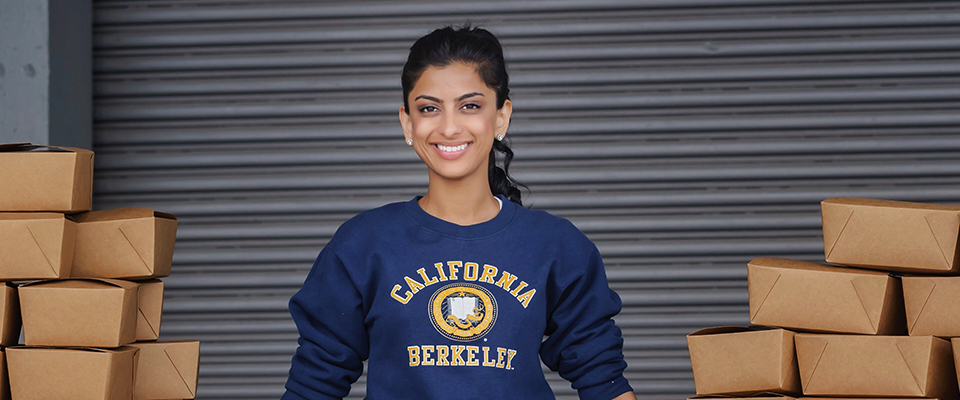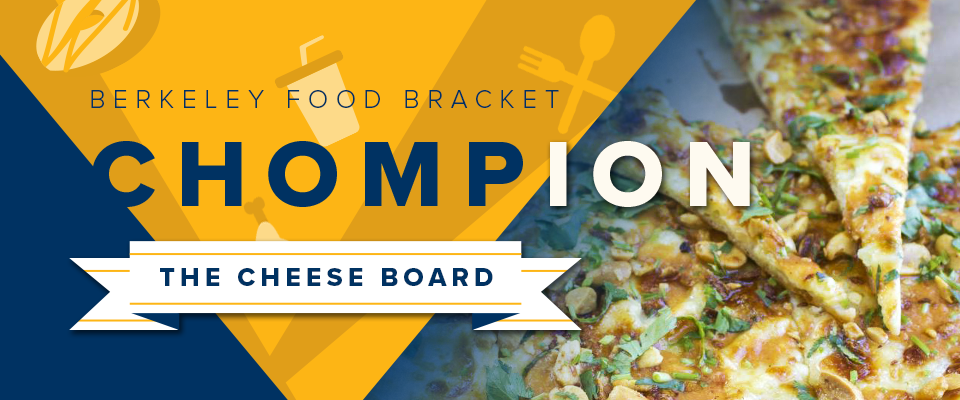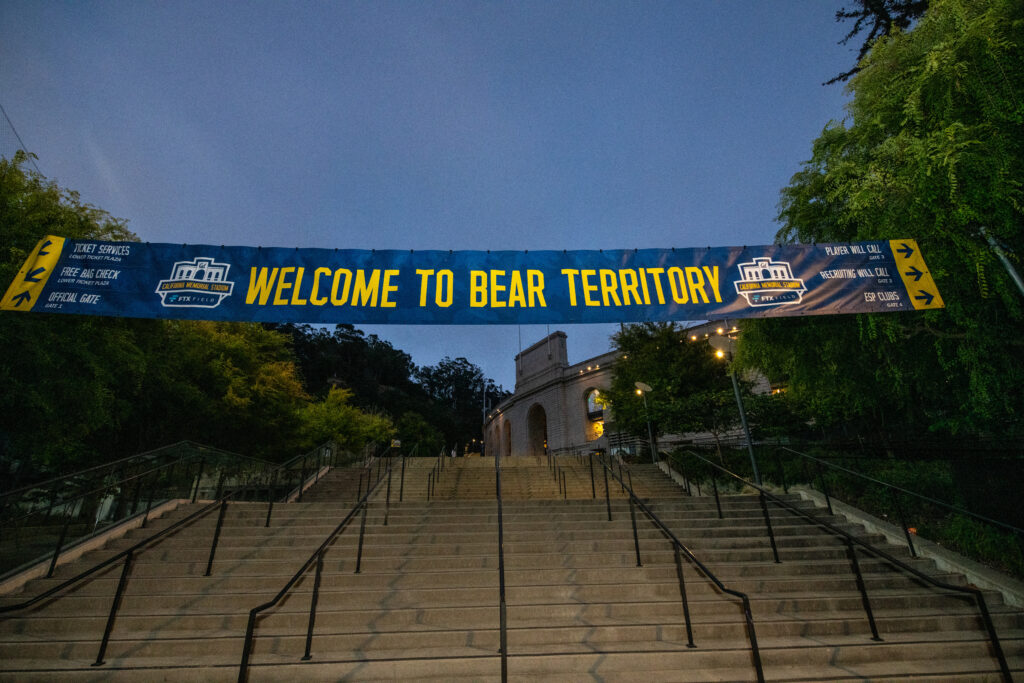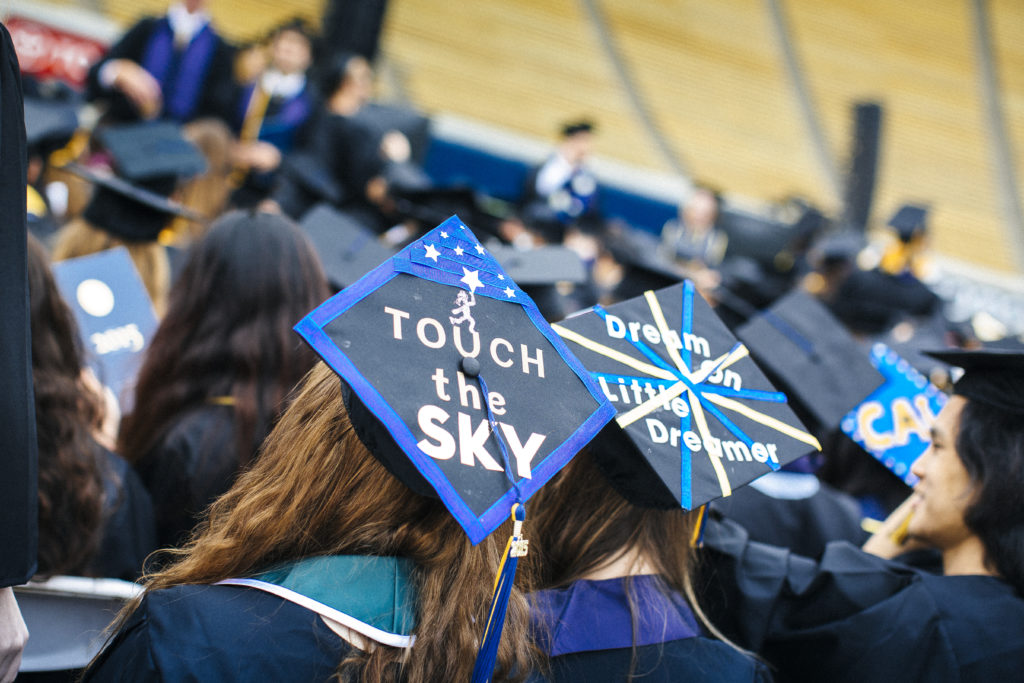At just two years old, Komal Ahmad ’12 had already decided: she wanted to become a doctor. “I thought that was the only way you could help people,” she remembers. Komal kept this goal close to heart throughout her childhood, even as she immigrated with her family from Pakistan to the United States.
When time came for Komal to go to college, she set her sights on Cal, fully intending to pursue a career as a doctor in the US Navy. The reality that Komal found at Berkeley, however, led her in a new direction.
The Veteran
At Berkeley, Komal joined the Naval Reserve Officers Training Corps (NROTC), just as she’d planned. What she hadn’t planned was how Berkeley would open her eyes to the extremes of the world’s health and wealth disparity issues. “Cal is located in close proximity to Silicon Valley, one of the wealthiest regions in the world, while also neighboring some of the Bay Area’s poorest communities,” Komal states. “Those who have access to an abundance of quality food and those in need of food are often right around the corner or across the street from one another.”
As a global poverty and practice minor, Komal took advantage of a pre-med program that allowed her to partner with an organization in Tanzania to work with patients, two-thirds of whom had tested positive for HIV. “Through this experience, I realized the limitations of medicine for solving systemic problems—as well as the limitless potential of designing large-scale solutions,” Komal explains.
“Cal is located in close proximity to…one of the wealthiest regions in the world, while also neighboring some of the Bay Area’s poorest communities. Those who have access to an abundance of quality food and those in need of food are often right around the corner or across the street from one another.”
These observations gradually prompted Komal to pursue a different dream, one that would serve people not just on an individual level, but on a wider scale. A chance encounter with a homeless veteran on Telegraph Avenue—whom she felt compelled to treat to lunch and ask his story—helped put all her new ideas in order.
The vet had just returned from a tour in Iraq but wasn’t receiving any benefits yet. He hadn’t eaten in three days. His story hit Komal close to home. “After meeting [him], my vision was crystallized,” Komal recalls. She would find a solution to redirect excess food away from the landfill and into the hands of those in need.
The Problem
This was the foundation upon which Komal started Bare Abundance, a food recovery program and student organization that aimed to address the food waste produced by the UC Berkeley dining halls. With support from the faculty and resources at UC Berkeley’s Blum Center for Developing Economies, as well as staff and students working at Cal Dining, Komal was able to test-drive her assumptions about food recovery.
At the time, UC Berkeley’s dining commons were throwing away hundreds of pounds of good food that simply hadn’t been eaten. Many students had already been putting pressure on the university to address the issue of overproduction and wasted food, but the employees at Cal Dining struggled with the logistics of food donation.
Samantha Lubow, Cal Dining’s Environment Initiatives Coordinator, remembers the struggle of balancing everything that needed to be done just for one organization to pick up their leftover food: “We needed to train our staff, buy materials to deliver the food in, find places to store the food until it was picked up, and—the hardest part—find nonprofits to pick up the food from our coolers.”
These were the issues Komal similarly encountered with Bare Abundance. Orders fell through, organizations failed to pick up the food as they’d promised, and food remained wasted. Komal soon realized: “In order to truly solve the problems of food waste and hunger, I needed to establish a for-profit company that could invest resources in the talent and technology needed to solve these problems.”

The Solution
After graduating from Cal in 2012, Komal tweaked the business model behind Bare Abundance to establish Feeding Forward. Over time, the company grew to its current form: Copia, a for-profit company that has recovered 1 million pounds of food, delivered more than 900,000 meals, diverted 3.5 million pounds of CO2e, and earned Komal nominations on the Forbes 30 Under 30 lists for Food & Drink and Immigrants.
“I was on my way back to California on a red-eye after speaking at a conference about food waste in Rhode Island, when a friend texted me to congratulate me [about the nominations] as my plane was taking off,” Komal remembers. “I didn’t even know about the award yet!
“I didn’t start Copia for the recognition, but it was definitely an affirming moment for me,” she adds. “To say that I was elated would be an understatement. I immediately shared the news with family and my Copia team—without all of whom this recognition would not even be possible.
“My parents immigrated to the US with me, when I was very young, with the hope that they could provide a better future for us. They sacrificed so much for my brothers and me. It’s an honor to be recognized (especially in these times) as an immigrant who is creating a better future for our country and the world.”
To date, Copia has worked with the San Francisco 49ers, collaborated with actress Freida Pinto to collect the leftovers from the 2017 Oscars, and built a new relationship with Cal Dining.
Two and a half years ago, Komal reapproached Cal Dining armed with a new plan to recover all of Berkeley’s excess foods. Some of this food Copia shares with the UC Berkeley Food Pantry, and some gets delivered to Albany Village to the student-parent association.
“Everyone at Cal Dining was eager to get on board,” Samantha remembers. “Copia provides us with metrics about our overproduction and what goes to waste, so we’re able to analyze what we’re producing too much of, and what we’re donating. Our chefs really applaud the program because it helps all of us streamline our process as well.”

Through Copia’s growth, Berkeley has remained near and dear to Komal’s heart. “Where else could I get Sliver pizza and Yogurt Park?!” she jokes, then adds, “To this day, Cal is one of Copia’s strongest food recovery partners. I believe partnering in this way is the best way I can give back to Cal, and I can’t wait to expand our operations to Cal’s stadium, across the UC system, and beyond in the coming years.”
Beyond Cal, Komal intends to scale Copia into a company that ultimately recovers and delivers any resource, ranging from clothing to medicine, within every city in the country. “Over the next five years, we are on track to multiply our impact by ten times to feed over 8 million people per year by 2023,” she states.
Komal is eternally grateful for the unexpected opportunities Berkeley has given her, and she encourages current students and fellow alumni to similarly take advantage of the experiences they may not realize are out there for them. “There will be opportunities you can’t even fathom right now that will change the trajectory of your life in incredible ways if you’re open to them,” she shares. “Give yourself room to explore and be adaptable to the new experiences and opportunities that will inevitably come your way. Learn from your failures, and from these failures come your greatest lessons and eventually your greatest success.”
by Courtney Cheng ’16





















